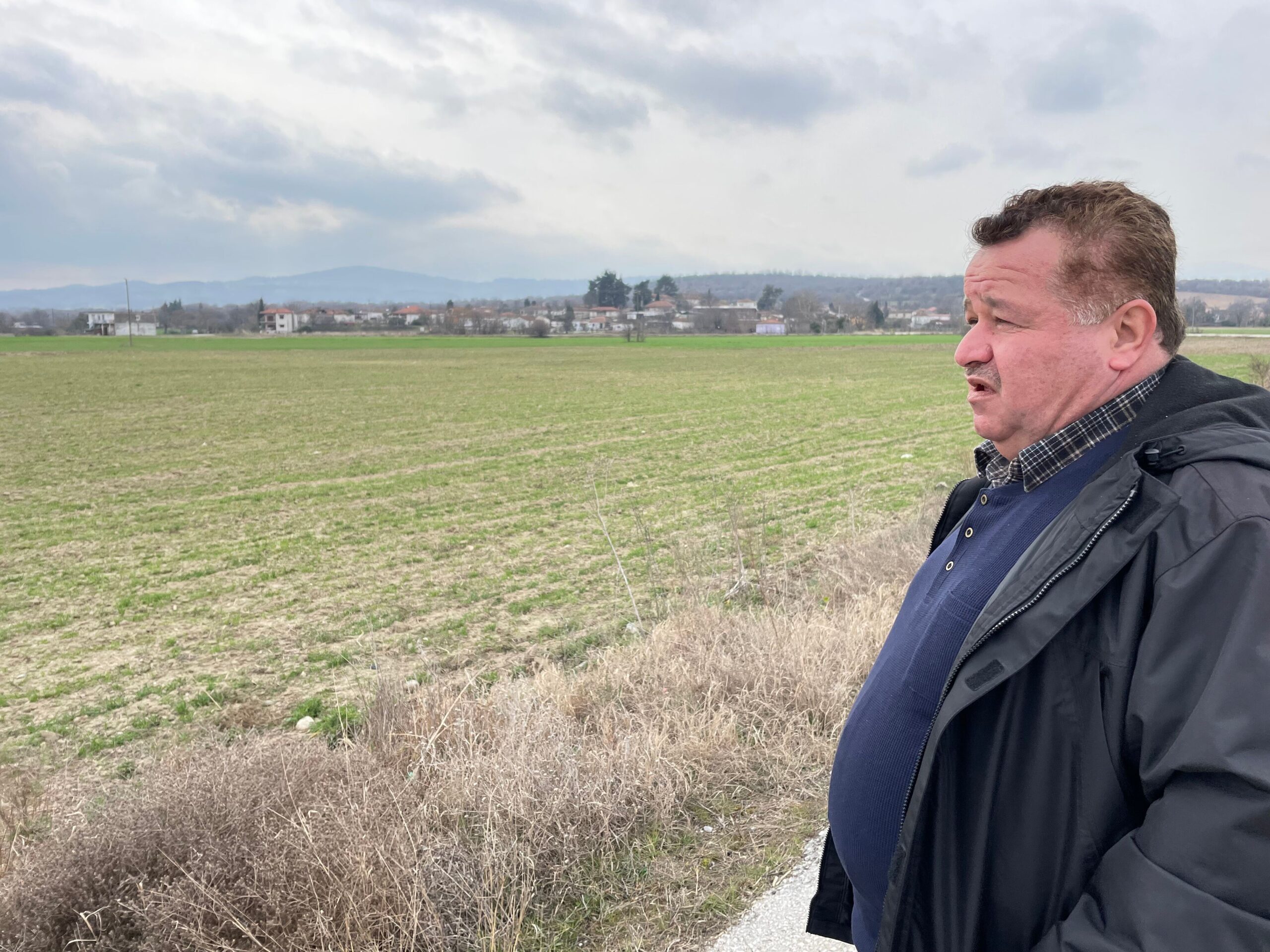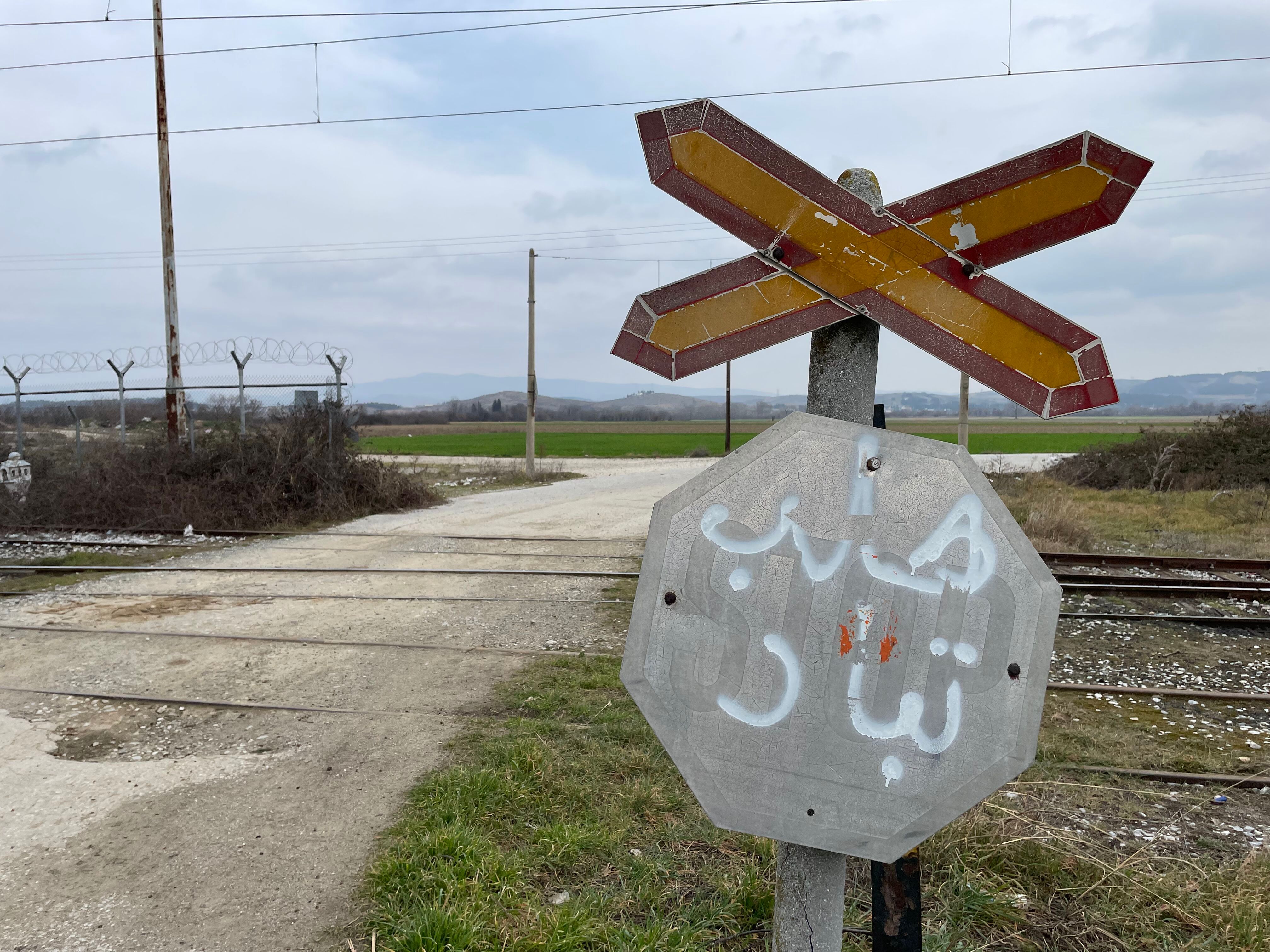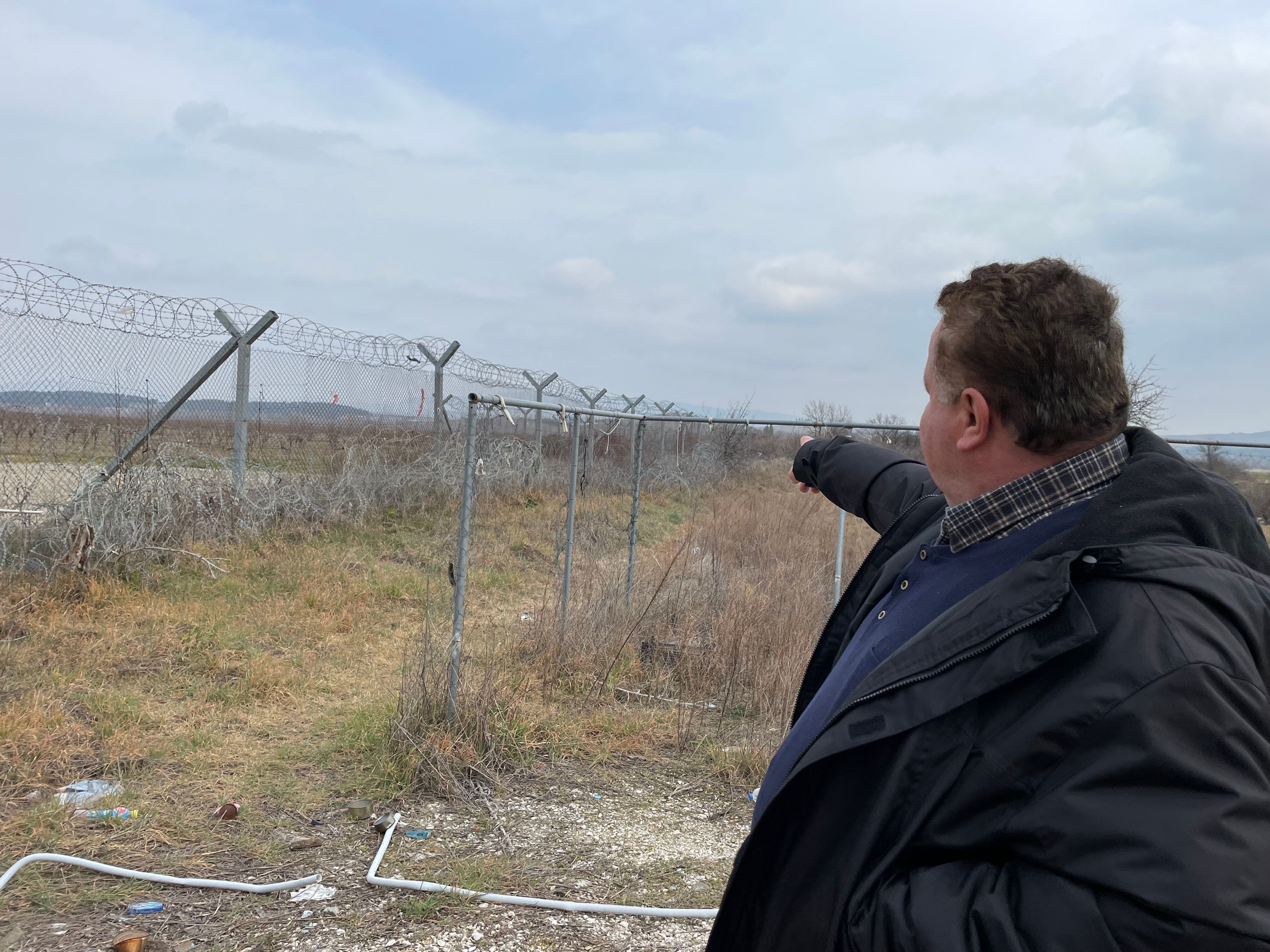Idomeni, Mohammed’s journey back
Eight years ago Mohammed had pitched a tent in Idomeni, he was one of the many Syrian refugees travelling on the Balkan route. Today he is a Belgian citizen with an EU passport. He has recently returned where this story began, in Idomeni, a place that occupied European chronicles for a long time

Idomeni-il-viaggio-a-ritroso-di-Mohammed
Mohammed (photo T. Miglierina)
Wheat fields are back to being what they always were: fields. The milder than usual winter has stemmed green grass that usually comes later. In February eight years ago, there was very little grass to be seen here: the fields of Idomeni had been stormed by thousands of refugees who wanted to cross the Macedonian border, travelling along what would later be called the Balkan route. Unable to cross the fence, and above all the gate of the Thessaloniki-Skopje railway which passes right here, they had decided to camp. In short, between tents, camp toilets, humanitarian organisations, police vans, television vans, and locals who sold everything they could sell, there was little cultivable space left. The rains had done the rest. Mud was everywhere and the farmers were furious.
Eight years later, hardly any traces remain. The amount of garbage is standard for many railways. On a sign, however, there is faded writing, in Arabic, made with spray paint: "Aleppo is destroyed". Behind there are the tracks on which at one point some refugees camped because "if they don’t let us in, we will block their economy".
They were mostly Kurds, then Syrians, Afghans, Pakistanis, and much more. They had left Turkey with the mirage of Germany and Northern Europe. They shouted “Merkel, Merkel”, sent the children ahead with flowers in their hands and walked towards the border fence. To repel them, the Macedonian police and army fired rubber bullets or tear gas, provoking protests in Athens, among other things. Then they denied everything. Once, a colleague picked up a bullet from the ground and put it under the nose of the police spokesperson.
Among those refugees there was Mohammed, who came from a Syrian city along the Euphrates, which had fallen into the hands of ISIS shortly before. Having to choose between the Assad regime and the butchers of the Islamic State, he and his son had chosen to flee. “This fucking gate is open now”, he says looking at the embankment. It is true: the gate is wide open and the police sentry boxes – which let only a few dozen people pass a day, only Syrians – are lying rusty. Since the freight train not far away seems to be in no hurry to move, we could climb over the milestones as many times as we wanted, but there is no need, because we both have a European passport in our pockets, exhibited (by Mohammed with some glee) to the customs officers of Skopje when we landed. This time we are not here to seek asylum or write reports, but to cure our teeth and back pain. And this is just a trip.
Measuring, not just in kilometres, the distance you have travelled in life, from when you slept under a plastic tent to a Flemish village where your wife works, you too, and your daughters are the best at school in Dutch is not something for everyone. Today Mohammed lives in a place where it takes people up to two years to trust you, but where you can walk down the street in the evening without fearing that someone with many weapons and no qualms will arrive. He has been a Belgian citizen for over a year. His wife and daughters flew to him after his asylum application had been accepted. Only the son settled in Germany: reuniting the family there would have taken more time.
Moreover, things were not so simple in Belgium either: it took many days and thousands of cigarettes, dozens of forms, hours of interviews, and long waits, in the first reception centre located in a village whose far-right mayor was also the minister of Immigration. And then the language and citizenship courses (for a while Mohammed knew all the dates in the history of Belgium by heart) and then the visits to the landlords with the help of a local collective of fifty-year-old women, all divorced, some lesbians. And the neighbour who calls the police because another neighbour has not stopped working on the house after 5 pm, as per the municipal regulation. “Tomas, we in Syria never call the police. They take everyone away and you don’t know if and when your family will see you again. We in Syria talk to each other and we reach an agreement”. It took all this and more, but slowly the future became the present.
Mohammed never passed the Idomeni railway gate. When the place was about to be cleared – the conditions were unsustainable – he was transferred to another Greek camp and from there he was able to continue his journey. In Idomeni he was among the few who spoke English and this – together with some qualities of character – made him a sort of local spokesman for the migrants during the two months of stay. Reporters lined up to interview him. “At one point I began to ask that they at least bring us something. Once I chased away a group of onlookers shouting at them that we weren’t animals in a zoo".
Mohammed and I never met in Idomeni, we were introduced later in Belgium by a friend who worked as an aid worker and took him to eat in a restaurant in the village. The restaurant still exists and makes excellent kebabs. On the other hand, the shops that had sprung up for refugees – for food, tents, clothes… there was even a Western Union counter – have all disappeared.
Wikipedia says that until 1936 Idomeni was called Sehovo and was populated by Greeks and Bulgarians, united in revolting against the Ottoman Empire but then fighting each other to decide what to do next. Almost everyone here descends from refugees, whose existence was marked in just over a century by the Treaty of Santo Stefano, the Balkan wars, two world wars, the Treaty of Lausanne, the civil war, Yugoslav communism, the dictatorship of the Greek colonels, the dissolution of Tito’s federation, and finally by those Middle Eastern upheavals which in the summer of 2015 took thousands of people off our TV screens and onto the beaches and our holiday islands.
Perhaps this is what really annoys us about migrants: that they have a destination to arrive at, which is us, while we are already here, we do not have a place to strive for. Before leaving Idomeni, we find the precise spot where Mohammed, exactly eight years ago, had pitched his tent. “Don’t photograph this. Just tell me please which way is south". And he – who since I have known him has been in far fewer mosques than I have – kneels to thank his God. He kneels on the damp earth that was his home for two months, but now it is just grass again.
Post scriptum: after reading the text, Mohammed asked me to add that he is grateful to Belgium and Flanders for welcoming him and his whole family.
Featured articles
- Take part in the survey
Idomeni, Mohammed’s journey back
Eight years ago Mohammed had pitched a tent in Idomeni, he was one of the many Syrian refugees travelling on the Balkan route. Today he is a Belgian citizen with an EU passport. He has recently returned where this story began, in Idomeni, a place that occupied European chronicles for a long time

Idomeni-il-viaggio-a-ritroso-di-Mohammed
Mohammed (photo T. Miglierina)
Wheat fields are back to being what they always were: fields. The milder than usual winter has stemmed green grass that usually comes later. In February eight years ago, there was very little grass to be seen here: the fields of Idomeni had been stormed by thousands of refugees who wanted to cross the Macedonian border, travelling along what would later be called the Balkan route. Unable to cross the fence, and above all the gate of the Thessaloniki-Skopje railway which passes right here, they had decided to camp. In short, between tents, camp toilets, humanitarian organisations, police vans, television vans, and locals who sold everything they could sell, there was little cultivable space left. The rains had done the rest. Mud was everywhere and the farmers were furious.
Eight years later, hardly any traces remain. The amount of garbage is standard for many railways. On a sign, however, there is faded writing, in Arabic, made with spray paint: "Aleppo is destroyed". Behind there are the tracks on which at one point some refugees camped because "if they don’t let us in, we will block their economy".
They were mostly Kurds, then Syrians, Afghans, Pakistanis, and much more. They had left Turkey with the mirage of Germany and Northern Europe. They shouted “Merkel, Merkel”, sent the children ahead with flowers in their hands and walked towards the border fence. To repel them, the Macedonian police and army fired rubber bullets or tear gas, provoking protests in Athens, among other things. Then they denied everything. Once, a colleague picked up a bullet from the ground and put it under the nose of the police spokesperson.
Among those refugees there was Mohammed, who came from a Syrian city along the Euphrates, which had fallen into the hands of ISIS shortly before. Having to choose between the Assad regime and the butchers of the Islamic State, he and his son had chosen to flee. “This fucking gate is open now”, he says looking at the embankment. It is true: the gate is wide open and the police sentry boxes – which let only a few dozen people pass a day, only Syrians – are lying rusty. Since the freight train not far away seems to be in no hurry to move, we could climb over the milestones as many times as we wanted, but there is no need, because we both have a European passport in our pockets, exhibited (by Mohammed with some glee) to the customs officers of Skopje when we landed. This time we are not here to seek asylum or write reports, but to cure our teeth and back pain. And this is just a trip.
Measuring, not just in kilometres, the distance you have travelled in life, from when you slept under a plastic tent to a Flemish village where your wife works, you too, and your daughters are the best at school in Dutch is not something for everyone. Today Mohammed lives in a place where it takes people up to two years to trust you, but where you can walk down the street in the evening without fearing that someone with many weapons and no qualms will arrive. He has been a Belgian citizen for over a year. His wife and daughters flew to him after his asylum application had been accepted. Only the son settled in Germany: reuniting the family there would have taken more time.
Moreover, things were not so simple in Belgium either: it took many days and thousands of cigarettes, dozens of forms, hours of interviews, and long waits, in the first reception centre located in a village whose far-right mayor was also the minister of Immigration. And then the language and citizenship courses (for a while Mohammed knew all the dates in the history of Belgium by heart) and then the visits to the landlords with the help of a local collective of fifty-year-old women, all divorced, some lesbians. And the neighbour who calls the police because another neighbour has not stopped working on the house after 5 pm, as per the municipal regulation. “Tomas, we in Syria never call the police. They take everyone away and you don’t know if and when your family will see you again. We in Syria talk to each other and we reach an agreement”. It took all this and more, but slowly the future became the present.
Mohammed never passed the Idomeni railway gate. When the place was about to be cleared – the conditions were unsustainable – he was transferred to another Greek camp and from there he was able to continue his journey. In Idomeni he was among the few who spoke English and this – together with some qualities of character – made him a sort of local spokesman for the migrants during the two months of stay. Reporters lined up to interview him. “At one point I began to ask that they at least bring us something. Once I chased away a group of onlookers shouting at them that we weren’t animals in a zoo".
Mohammed and I never met in Idomeni, we were introduced later in Belgium by a friend who worked as an aid worker and took him to eat in a restaurant in the village. The restaurant still exists and makes excellent kebabs. On the other hand, the shops that had sprung up for refugees – for food, tents, clothes… there was even a Western Union counter – have all disappeared.
Wikipedia says that until 1936 Idomeni was called Sehovo and was populated by Greeks and Bulgarians, united in revolting against the Ottoman Empire but then fighting each other to decide what to do next. Almost everyone here descends from refugees, whose existence was marked in just over a century by the Treaty of Santo Stefano, the Balkan wars, two world wars, the Treaty of Lausanne, the civil war, Yugoslav communism, the dictatorship of the Greek colonels, the dissolution of Tito’s federation, and finally by those Middle Eastern upheavals which in the summer of 2015 took thousands of people off our TV screens and onto the beaches and our holiday islands.
Perhaps this is what really annoys us about migrants: that they have a destination to arrive at, which is us, while we are already here, we do not have a place to strive for. Before leaving Idomeni, we find the precise spot where Mohammed, exactly eight years ago, had pitched his tent. “Don’t photograph this. Just tell me please which way is south". And he – who since I have known him has been in far fewer mosques than I have – kneels to thank his God. He kneels on the damp earth that was his home for two months, but now it is just grass again.
Post scriptum: after reading the text, Mohammed asked me to add that he is grateful to Belgium and Flanders for welcoming him and his whole family.












